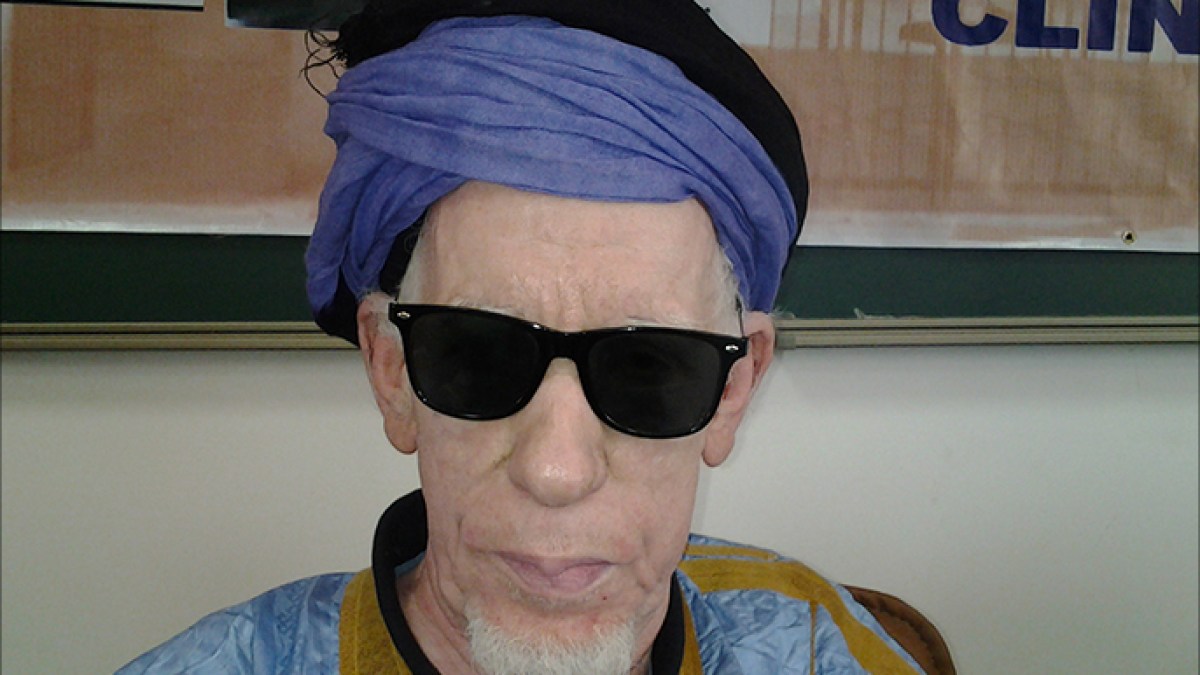Hamden Ould Al-Tah graduated from his family’s barn as a scholar of jurisprudence and language (Al-Jazeera)
A Mauritanian scholar, writer, and poet, his presence was witnessed on the platforms of fatwa, advocacy, and guidance for many decades. He worked to enrich the “jurisprudence of reality” and contributed to the development of the “jurisprudence of Islamic banking issues.” He practiced teaching, held many high-ranking positions in his country, and participated in many international seminars and conferences.
Birth and upbringing
Hamden Ould Al-Tah was born in 1933 in the suburbs of Al-Mudhardha in southwestern Mauritania. He grew up in the embrace of a family of knowledge, piety, righteousness, and spiritual standing, which was keen on educating and raising him, and he grew up as a poet, writer, scholar, and guide.
Study and training
He grew up in an environment of science and learning, and an environment in which his family studied science and literature, studying, teaching, and debating. He read the texts of Islamic jurisprudence and the Arabic language, with its grammar and eloquence, and added to that logic, theology, and the study of principles.
He absorbed the traditional texts of the Mauritanian libraries (Katatib), and graduated from his family’s library as a scholar of jurisprudence and language. His genius was clear in the field of what was known in the Mauritanian schools at that time as rational sciences, such as logic, the sciences of monotheism, and belief.
After completing his prohibited studies, he moved to contemporary studies in the field of Islamic jurisprudence and Arabic language sciences. He was sent to Tunisia in 1961 as part of a one-year training mission during which he obtained a professional certificate in teaching.
Hamden Ould Al-Tah contributed his scientific efforts to many issues and calamities (Al-Jazeera)
Jobs and responsibilities
He joined the teaching profession in 1957, before the independence of Mauritania, then received training in teaching in Tunisia, and after his return from there he was appointed professor of the Arabic language and Islamic sciences at the Institute of Islamic Studies in the city of Boutilimit.
In the period 1971-1975, he served as Director of Islamic Guidance, then Minister of Islamic Affairs in the period 1975-1977, then Ambassador in charge of Arab and Islamic Affairs at the Ministry of Foreign Affairs, then Director of Islamic Guidance in 1978 until his retirement in 1988.
After his retirement from public service, he held some senior positions in the country's constitutional bodies. In 1997, he was appointed a member of the Supreme Islamic Council (a supreme advisory constitutional body), and a member of the Supreme Council for Fatwas and Grievances in 2012. He was also elected Secretary-General of the Association of Mauritanian Scholars.
His activity after retirement focused on advisory work in the field of Islamic transactions. He worked as a Sharia advisor to several financial and banking bodies, including Al Baraka Islamic Bank in Mauritania, the Mauritanian Islamic Bank “Morris Bank,” and the Popular Savings and Loan Funds.
Intellectual orientation
He was known for his modern Islamic intellectual orientation, and he was one of the Mauritanian jurists who called for innovation and the tendency to ijtihad within the framework of the legal text, to create a jurisprudence that takes into account legal controls and responds to the requirements of contemporary life.
Scientific experiment
Due to his search for formulas for harmonization between the needs of the contemporary Muslim and the texts of Sharia, he focused on the objective dimension in Sharia rulings to devise rulings that enable immigrant Muslims to harmonize with non-Muslim societies without compromising on their worship.
He also focused his research in the field of Islamic transactions on formulas that encourage banks to engage in Islamic transactions. He wrote several studies in this field and contributed to setting the basic regulations for the Islamic branches of these banks in his country.
In addition to that, he tried to bring the jurisprudential rulings in ancient books (such as Khalil bin Ishaq’s summary of jurisprudence) closer to students and young people who were not educated in classrooms, so he presented the rulings on acts of worship and transactions in simplified rules.
Hamden Ould Al-Tah received many awards and honors and participated in many conferences (Al-Jazeera)
Compositions
He has several books in the field of Islamic law and the Arabic language, including:
“Scheduling the Sciences of the Qur’an.”
“Scheduling of Hebron jurisprudence.”
“Scheduling the principles of jurisprudence.”
“Logic scheduling.”
Regulations for the rules and etiquette of the mosque.
“Important Benefits in Common Issues”, which is written in the jurisprudence of contemporary calamities.
He has a large collection of poetry, and he also has some light books on some issues, the most famous and widely circulated of which are “The Heavy.”
Awards and honors
He participated in many international and regional conferences, and his academic standing and advocacy and research efforts qualified him to obtain many awards and honors. He was awarded the “Commander Medal,” which is the highest honor given to civilian figures in Mauritania.
The King of Morocco, Mohammed VI, accompanied by the scholar Sheikh Mohammed Salem Ould Adoud, also awarded him the Scarf of Islamic Thought, and the United Nations honored him for his efforts in the field of awareness and collective activity.
Death
Hamden Ould Tah died on February 12, 2024 in the Mauritanian capital, Nouakchott, after years of weakness and bedridden. An official funeral was held for him, attended by government representatives and thousands of mourners.
He was buried in the Al-Madrum cemetery in the state of Trarza, 120 kilometers south of the capital, Nouakchott.
Source: Al Jazeera

